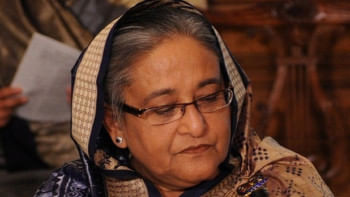JS boycotted, not the money
Thirty seven lawmakers of BNP, two of Jamaat-e-Islami and one of Bangladesh Jatiya Party boycotted parliament for 316 days in 17 sessions of the current parliament, but received allowances and perks of Tk 4.49 crore, says a report of Transparency International Bangladesh.
They were present in the House in only 54 of 370 sittings of the ninth parliament that began on January 24, 2009.
A total of 172 hours were wasted between the first and fifteenth session for quorum crisis though the Awami League-led alliance has more than 300 lawmakers in the House. It caused a loss of Tk 59 crore to the state exchequer, said the TIB report released at a press conference at the Brac Centre Inn in the capital yesterday.
“Twenty-four minutes and 27 seconds were wasted on an average in every working day due to quorum crisis, and the nation had to spend Tk 78,000 a minute during the parliament session,” the report said.
Though the TIB findings were based on data from the eighth to 15th session, The Daily Star collected data on the previous sessions from TIB, and calculated the total time and money wasted due to quorum crisis in all 17 sessions.
TIB had earlier published two reports on the current parliament in July 2009 and June 2011.
The Leader of the Opposition Khaleda Zia has so far attended eight parliament sittings while her archrival and the Leader of the House Sheikh Hasina took part in 266 sittings.
Lawmakers spent 502 hours and 19 minutes in 163 sittings from the eighth to 15th session. Though the main task of lawmakers is to make laws, the TIB study found they spent only 13 minutes [7 percent of the total time] on an average to pass a bill in parliament. And a total of 72 bills were passed between the eighth and 15th session.
 Transparency International Bangladesh (TIB) Executive Director Dr Iftekharuzzaman, middle, speaks at a press conference unveiling a TIB report on parliament at the Brac Centre Inn in the capital yesterday. Photo: Star
Transparency International Bangladesh (TIB) Executive Director Dr Iftekharuzzaman, middle, speaks at a press conference unveiling a TIB report on parliament at the Brac Centre Inn in the capital yesterday. Photo: Star
In India, lawmakers spent 30 percent of the total time to pass a law in 2012, while it was 55 percent in the UK in 2009-10, TIB said.
Of the total time (from the eighth to 15th session), lawmakers spent highest 114 hours and 22 minutes for discussions in two budget sessions (2011-12 and 2012-13), and the second highest 97 hours were spent for discussions on thanks-giving motion on the president's speech.
There was no participation of opposition lawmakers in the law-making process though they were present in 10 sittings between the eighth and 15th session. Opposition lawmakers also boycotted all four budget sessions of the current parliament, said the report.
“The way a bill was passed in parliament indicated that people's participation was not there in the process.” Besides, women lawmakers' participation in the law-making process is very limited, said TIB.
Lawmakers spent 11 percent of the total time on discussions on call attention notices on public interest issues, and 4 percent on unscheduled discussions in which they used unparliamentary and abusive words to criticise their rivals, observed the report.
No discussion was held on any of the 381 adjourned motions for absence of opposition lawmakers or the Speaker's rejection, according to the report.
On the parliamentary bodies, the report said 51 standing committees have so far held 1,661 meetings and made over 2,500 recommendations, most of which were ignored by ministries concerned.
TIB recommended bringing an end to “the culture of parliament boycott”. “And if needed, a law should be made to prevent any lawmaker from remaining absent in parliament for more than 30 sittings at a stretch,” it said.
On the issue of boycotting parliament, Awami League lawmaker Tofail Ahmed said all parties should shun the culture of boycotting parliament and there should be a law to stop this practice.


 For all latest news, follow The Daily Star's Google News channel.
For all latest news, follow The Daily Star's Google News channel. 



Comments